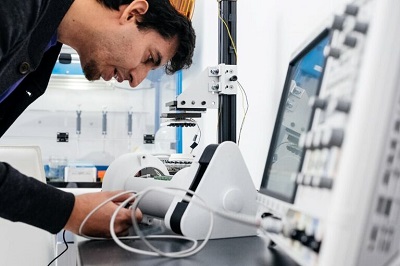NSF Convergence grant dovetails with Microsoft PREMONITION program expansion

Vanderbilt engineers are leading the academic component of a massive Microsoft project that combines robotics, genomics, big data collection-and mosquitos-to monitor the environment and detect potential pandemics and other threats before they cause widespread outbreaks.
Microsoft announced today expansion of its PREMONITION program and a large-scale pilot test in the Houston area. The Vanderbilt Institute for Software Integrated Systems, which has been working with Microsoft since the program began five years ago, is the lead institution on a related National Science Foundation Convergence Accelerator grant.
The NSF Convergence Accelerator supports use-inspired, team-based, multidisciplinary efforts that address challenges of national importance. Phase 1 grants provide up to $1 million for nine months for teams to build a proof-of-concept. Janos Sztipanovits, E. Bronson Ingram Distinguished Professor of Engineering and director of the Vanderbilt Institute for Software Integrated Systems, is the principal investigator the projects, "Deep Monitoring of the Biome Will Converge Life Sciences, Policy, and Engineering."

The Microsoft technology stack consists of robotic platforms for monitoring and intelligently sampling disease carriers - such as mosquitoes - and cloud-scale metagenomics for genetically analyzing environmental samples collected by its sensor network for known and novel biological threats. The complete technology stack is designed to enable continuous monitoring and cost-effective prioritized sequencing of the environment. The company has built a large-scale proving ground in Harris County, Texas.
Vanderbilt and its partners are tackling the data. The goals include fusing novel biome and ecological data streams into unified datasets and generating predictive AI models for use across disciplines. New science and technology ecosystem that emerges from the effort would have wide impact on human health, agriculture, national security and ecology.
"By accelerating the development of new predictive mosquito models, especially by generalizing them to additional species, this project will provide long lasting contributions to human health and pandemic preparedness," Sztipanovits said.

Collaborators on the Convergence Accelerator pilot in addition to Microsoft include Johns Hopkins University, the University of Washington, University of Pittsburgh Medical School, ClimaCell and the Harris County (Texas) Department of Public Health. PREMONITION is directed by Ethan Jackson, Ph.D.'07, a former student of Sztipanovits and Senior Director and Principal Researcher at Microsoft Healthcare.
The project grew out of an Intelligence Advanced Research Projects Activity (IARPA)-funded project Vanderbilt engineers coordinated with Microsoft that included successful proof-of-concept tests in West Africa, the Caribbean and Texas. That initial effort focused on mosquitos; the expansion of the program includes early detection of other types of pathogens.
"I am quite excited about this project because if anything this can have a major impact on the world," Sztipanovits said.
The NSF-funded project brings together many disciplines-computer scientists, ecologists, epidemiologists, policy makers, public health organizations and industries-for scalable biome monitoring networks of the future.
"The quantum technology and AI-driven data and model sharing topics were chosen based on community input and identified federal research and development priorities," said Douglas Maughan, head of the NSF Convergence Accelerator program. "We are excited for these teams to use convergence research and innovation-centric fundamentals to accelerate solutions that have a positive societal impact."






